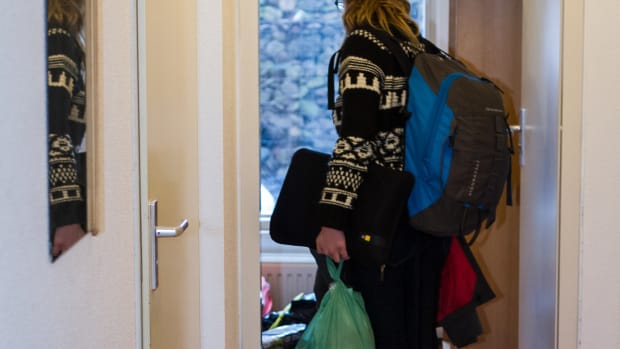
Welcome to Amsterdam, welcome to the housing crisis
This week thousands of prospective students are arriving in the city looking for a place to live before their Bachelor’s or Master’s begin. When a new academic year is looming, that means the housing race is about to start too. “Scammers kept messaging me and responding to my posts on Facebook.”
In July 2020, I was surfing on Kamernet, adjusting the website’s filters to my budget and other requirements, patiently searching for the cutest De Pijp one-bedroom apartment with rooftop access and a view of the canals. I was astonished to find out that my only option was to rent an underground parking spot in the centre of Amsterdam.
Like me in 2020, this summer, Whatsapp chats and Facebook groups are bursting, everyone is on the lookout for the best apartment, or maybe just a small 4m2 bedroom in the study of a shared flat outside the ring will do?
Among Facebook scams, thousands of websites and their various subscription fees, the queue for university student housing, the dilemma of living inside or outside the ring and paying rent that goes from a lucky 500 euros up to a shocking, but customary, around 900 euros a month, international students in Amsterdam resolutely do not have it easy.

Non-success stories
Lucy Chauche (19, bachelor anthropology), arrived to Amsterdam from France in the mid of the covid pandemic, in September 2020. During the first year she lived in a room she found via UvA student housing. By the end of her contract however, she did not have anywhere to move to because she was unable to find a room even though she had been searching for months.
Lucy was living at her friend’s house for a month after she had to leave her student accommodation. “It was stressful, as I did not have any leads.” She remembers: “Scammers kept messaging me and responding to my posts on Facebook, I would not have given them my personal information, but they tried to scam me.”
Month by month extension
Yet, by the end of September, she had found temporary housing in Noord through Facebook, which was initially meant to last for a month. “It was always uncertain. I was living with siblings who were around 30 years old, and the contract kept on being extended month by month.”
She considers herself lucky as she has friends in Amsterdam who were willing to host her and a family that can support her financially. But this does not reflect everyone’s experience. “I know people who have had to spend months in hostels because they could not find any housing, that does not give you much security. I also have a friend who struggles with balancing university and full-time jobs to be able to pay the expensive rent in the city.”
The rent Lucy pays now is on the higher end. “I am constantly wondering if it is worth it. A lot of students from my course decided to go back to their home country and study online.” She adds: ‘In comparison to Dutch students, we pay a lot, sometimes they pay 200-300 euros a month for nice accommodation within the city, while my flat mate is considering moving to Haarlem or Zaandam because the more broke you get, the more desperate you are about finding housing and the further away you have to live.”
Outside Amsterdam
Shree Narayanan (21, bachelor econometrics) has already settled for living outside Amsterdam. He moved to Amsterdam from India over three years ago and found his first room through the student housing provider Duwo. There, international students are prioritised for student housing when they first move to Amsterdam.

For him as well, the trouble started after her first year. Shree explains: “At the time, I registered on room.nl [a housing registration platform], but the longer you are registered the higher the chances of getting housing. So for international students by the time we learn about this we don’t get housing, we are disadvantaged or must pay a subscription to rental websites such as Kamernet. Looking via a website such as Funda or Pararius, is almost never successful.”
Shree has never lived within Amsterdam; First, he lived in the suburb of Duivendrecht for 600 euros a month. The following year he found another room in neighboring Weesp for a cheaper price. Every year, he is moving further away from Amsterdam.
Soon, he will be leaving Amsterdam surroundings for the village of Naarden-Bussum, as he found a room there for a very good price. However, it is located thirty minutes by train from Amsterdam Central Station, hence Shree is sacrificing accessibility to university for affordable housing. On top of that, internationals don’t have free transport like Dutch students.
Gold mine
What is especially interesting about Shree’s situation compared to Lucy’s, who is from the EU, is that he pays over 9.000 euros tuition fees each year, and does not have the guarantee of having a roof over his head. “If you are calling in students from abroad you must be able to accommodate them, there must be a balance. The UvA wants to earn money, so they enroll as much students as they want, but there is no housing ability. What the university should do, is give a housing contract to their international students for as long as their study programs lasts, that is the minimum they could do.”
International students are a gold mine for universities all over the world, Shree says. “In the first year my student housing rent was 450 euros, I paid a double deposit when I moved in, 500 euros student housing application fees, 9.000 euros tuition fees and 200 euros course application fees.”
Here are some tips for affordable options in Amsterdam.
1. Community buildings such as Academie van de Stad offer rooms with reduced or free rent, in exchange for voluntary work.
2. Acta, an old-faculty building from the UvA, offers rooms to students and is more affordable.
3. Antikraak (or anti-squat), vacant rentals across the city for a more affordable price, part of an initiative to avoid squatters. There are certain real estate agencies which are specialiserd in anti-squat rental, such as De Zwerfkei, Alvast or Antikraak.nl.
4. Temporary housing at the Student Hotel or Casa Amsterdam, an accessible option where students can live all year except for the Summer. The rent is usually very high, though.
5. According to the ‘Leegstandswet’, students can look ook for an empty building, and then ask subsidy from Asva to fix it for you.
According to Job Vermaas, member of the Asva student union board, the most important thing when looking for a room is having low expectations. “You won’t end up living on Herengracht! Dutch students have a network, even if they are not from Amsterdam, but for internationals the problem is that there is an increasing number of them coming here and cannot live with their parents, and they have no network to help them.”
Internationals must rely on the internet and be careful not to get exploited. “They are not aware of the laws and their rights in Amsterdam, and landlords ask prices that are way too high for rooms that are way too small.” Job advices to check out the LSVb website, on which one can get a room checked and its prices assessed. In addition to this, landlords often ask for additional costs too, such as key money (in Dutch: sleutelgeld) or administrative costs (in Dutch: administratiekosten), which are illegal or strictly regulated.
However, as Amsterdam experiences a shortage in living spaces, some landlords charge tenants, nevertheless. ‘If that happens to you, you should contact the judicial office of Woon!, they take care of housing rights for tenants’.
The solution would be for the municipality of Amsterdam to establish a plan regarding student housing, says Job. However, this is not on the agenda currently.

